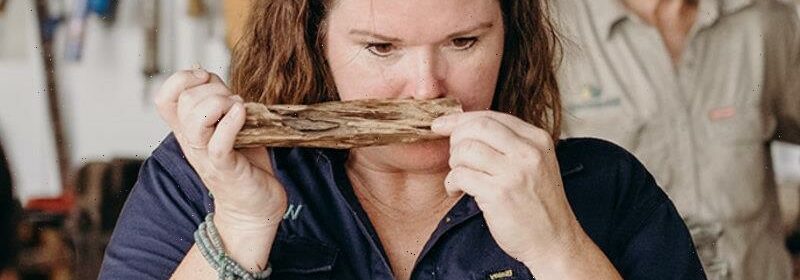It costs up to $100,000 a kilo and Queensland farmers are growing it for luxury perfume

Being bundled into a minivan in Cairns and instructed by the driver to not tell anyone my movements feels more like a hostage situation than a luxury experience. I try memorising the route. A left turn, then a roundabout followed by cane fields, more cane fields, or is that the same cane field?
Discretion is required because the hinterland destination is home to essential perfume ingredients rivalling the roses in the south of France for value. Roses are rare in the Queensland tropics but Agarwood, which can cost more than $100,000 for a kilogram, smells much sweeter to grower Tim Coakley, executive chairman of Wescorp.
Wescorp farmers Tim and Fleur Coakley with Agarwood, a prized perfume ingredient grown in Queensland.Credit:Luminosity
“Most Australians don’t understand how valuable this is, but occasionally, we see people slowly driving past,” Coakley says, surrounded by rows of Agarwood-producing Aquilaria trees arranged as neatly as the boxed citrus trees in the Orangery at Versailles. “We have cameras set up in the trees. If you go to Asia they have seven-foot walls and people wandering around with guns.”
Agarwood, extracted from Aquilaria trees, has provided the resin commonly known as oud to growers in Asia for centuries. Its smoke and leather notes were used in religious ceremonies before attracting the attention of perfumers such as Louis Vuitton, Chanel, Tom Ford and boutique Australian brand Goldfield & Banks.
The sweet-smelling wood is common in Vietnam, Cambodia and parts of India. In 2014, when a Malaysian fisherman caught a fragrant piece of wood in his nets, its value was estimated at $25 million, if it could be verified as Agarwood.
“The idea of Agarwood coming from Australia never crossed my mind,” says Goldfield & Banks founder Dimitri Weber, who specialises in fragrances that evoke the Australian landscape. The Banks in the brand name is a tribute to botanist Joseph Banks, who accompanied Captain Cook to Australia in 1770.
“When I read an article about Tim growing Aquilaria trees I couldn’t believe it.” After visiting the plantation Weber took samples of the organic oil to a trade fair in Milan. “People were mesmerised by the quality and the purity.”
Agarwood grower Tim Coakley from Wescorp; Silky Woods by Goldfield & Banks (100ml), $310.Credit:Luminosity
“Many oud perfumes are manipulated to amplify the character of the perfume, giving a false oud. Only a few people have experience of what real oud is. This is special.”
Coakley’s Agarwood, developed with daughter Fleur, is the central note of Weber’s fragrance Silky Woods. It is the most expensive ingredient in the Goldfield & Banks arsenal.
The Boronia oil Weber buys from Tasmania costs about $25,000 for a kilogram. Agarwood sets him back $24,160 for only 500 grams.
Before swapping your Bitcoin investments for a handful of Aquilaria seeds, growing the trees is as challenging as extracting the Agarwood and has taken Coakley years to perfect.
Having developed a business growing Sandalwood in Western Australia 28 years ago, the agricultural entrepreneur was eager to replicate his success with Agarwood. After planting 2000 trees in Kununurra in north-western WA, only two Aquilaria trees survived, but Queensland was more fruitful.
“We put it in 14 locations around the top of Australia,” Coakley says. “In 2008 we planted them and worked out the best spot is where we are now. It’s not about the rainfall but the humidity.”
To create Agarwood within the Aquilaria tree, it is induced with foreign matter, so the tree generates a sweet-smelling resin scab. Many overseas growers use poison but the Coakleys create fungi in a laboratory, hidden at the back of a tin shed, just past the row of shovels near the green wheelie bin.
“It’s a completely natural process,” Coakley says. “No chemicals are involved. This way we get a more even distribution of resin through the trees, and it’s more efficient to harvest.”
“We wanted to breed the best because we are competing against Asia. We want people like Dimitri to be able to say these are completely natural, organically pure agar oils.”
Provenance is important for Goldfields & Banks’ customers, which include Nicole Kidman and Keith Urban.
“We need to know who we are funding, who the people are and where it comes from,” Weber says.
Just don’t get too specific about where it comes from, or it’s a rough trip home in the minivan.
Make the most of your health, relationships, fitness and nutrition with our Live Well newsletter. Get it in your inbox every Monday.
Most Viewed in Lifestyle
From our partners
Source: Read Full Article

